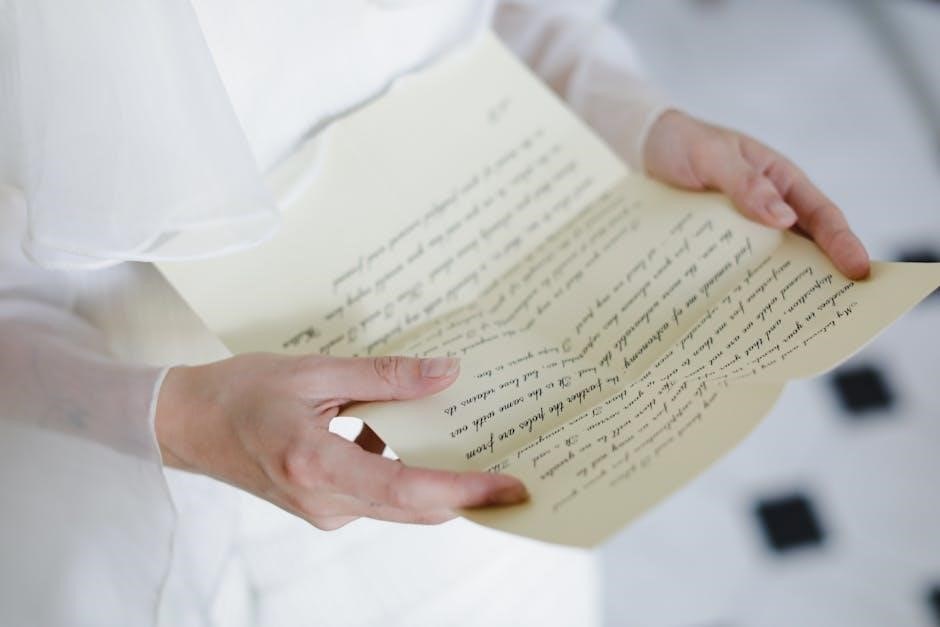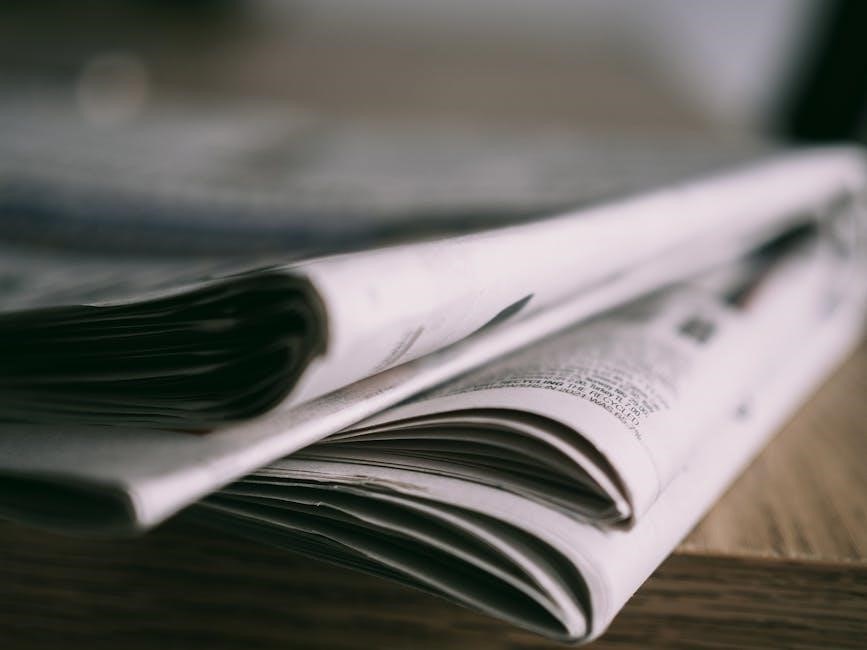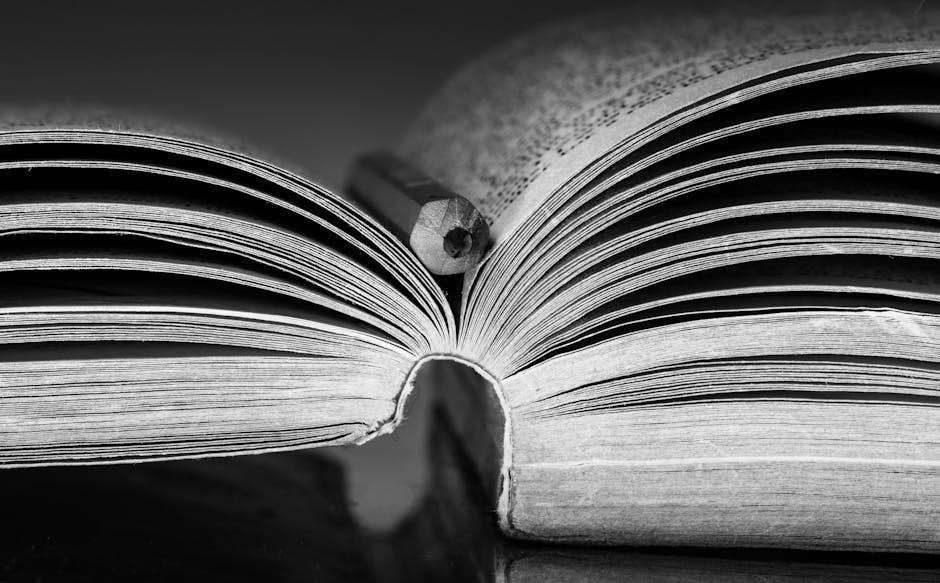Reading and writing about literature are foundational skills for understanding texts deeply. Close reading helps uncover themes‚ symbols‚ and meanings‚ while writing sharpens analytical thinking and expression.
1.1 The Importance of Literary Analysis in Understanding Literature

Literary analysis is crucial for uncovering the deeper meanings and themes within texts. It involves examining elements like symbols‚ motifs‚ and character development to understand the author’s intent. By breaking down the text‚ readers gain insights into cultural‚ historical‚ and social contexts‚ enhancing their appreciation of literature. Literary analysis also fosters critical thinking and analytical writing skills‚ essential for academic and professional endeavors. It encourages readers to evaluate how authors convey messages‚ promoting a more nuanced understanding of literary works and their significance in broader contexts.
Key Components of Literary Analysis
Literary analysis involves examining themes‚ symbols‚ motifs‚ and character development. It requires understanding the author’s intent and the cultural or historical context of the text.
2.1 Identifying Themes‚ Symbols‚ and Motifs in Literary Texts
Identifying themes‚ symbols‚ and motifs in literary texts is crucial for deeper understanding. Themes are central ideas explored in the text‚ often reflecting universal human concerns. Symbols are objects‚ colors‚ or images that carry meaning beyond their literal sense‚ while motifs are recurring patterns or elements that reinforce themes. To identify these‚ readers should pay attention to repetition‚ context‚ and authorial intent. For example‚ a rose might symbolize love‚ while recurring darkness could motif a struggle. Analyzing these elements helps uncover the text’s layered meanings and the author’s message. This process enriches interpretation and enhances critical thinking skills‚ making literature more engaging and thought-provoking.
2.2 Analyzing Character Development and Authorial Intent
Analyzing character development involves examining how characters evolve throughout a text‚ revealing their traits‚ motivations‚ and growth. This process helps readers understand the story’s themes and emotional depth. Authorial intent refers to the writer’s purpose behind specific choices‚ such as dialogue‚ events‚ or narrative structures. To uncover this‚ readers should consider historical context‚ the author’s background‚ and the text’s cultural setting. By exploring both character development and authorial intent‚ readers gain insight into the work’s underlying messages and the ways in which literature reflects human experiences and societal influences‚ enhancing their understanding and appreciation of the text.

The Process of Close Reading
Close reading is a detailed analytical technique that involves multiple readings of a text to uncover themes‚ authorial intent‚ and deeper meanings within literature.
3.1 Techniques for Deep Analysis of Literary Texts
Deep analysis involves breaking down texts into components like themes‚ symbols‚ and character development. Close reading techniques‚ such as annotating and examining word choices‚ enhance understanding. Identifying motifs and analyzing structure also reveal author intent. These methods help uncover layers of meaning‚ enabling a richer interpretation of literary works. By focusing on specific elements‚ readers can better grasp the nuances and complexities embedded in the text‚ fostering a deeper engagement with literature.

Researching Literature Effectively
Researching literature involves gathering secondary sources for context‚ analyzing themes‚ and exploring author intent. Effective research enhances understanding and supports compelling arguments in literary analysis.
4.1 Gathering Secondary Sources for Contextual Understanding
Gathering secondary sources is crucial for contextualizing literary works. These sources‚ such as scholarly articles‚ critiques‚ and analyses‚ provide insights into themes‚ historical backgrounds‚ and authorial intent. When researching‚ prioritize credible academic databases like JSTOR or Google Scholar to ensure reliability. Additionally‚ literary essays and books offer deeper interpretations‚ helping to frame your analysis. Evaluate sources for credibility‚ focusing on peer-reviewed materials. Effective use of secondary sources enriches your understanding‚ enabling you to situate the text within broader literary and cultural contexts. This step is essential for developing a well-supported and nuanced analysis.
Strategies for Writing Literary Analysis
Effective strategies for writing literary analysis involve understanding themes‚ symbols‚ and authorial intent. Use evidence-based arguments to support your interpretations‚ ensuring clarity and depth in your analysis.
5;1 Developing a Clear Thesis Statement
A clear thesis statement is the backbone of any literary analysis. It should concisely present the main argument‚ focusing on the author’s purpose‚ themes‚ or literary devices. Avoid vague statements; instead‚ craft a specific claim that reflects your interpretation. Identify the central idea of the text and narrow it down to a manageable focus. Ensure your thesis is supported by evidence from the text and guides the entire analysis. A strong thesis statement sets the direction for your essay‚ making it easier to organize and develop your arguments effectively.
5.2 Structuring the Essay to Support Your Argument

Structuring your essay effectively is essential for presenting a coherent argument. Begin with an introduction that outlines the thesis and provides background on the text. Body paragraphs should focus on specific points‚ supported by textual evidence and analysis. Each paragraph should have a clear topic sentence‚ evidence from the text‚ and your interpretation of that evidence. Use transitions to connect ideas and maintain logical flow. Conclude by restating your thesis and summarizing key points‚ ensuring your argument is clearly supported throughout the essay. This structure helps readers follow your analysis and engage with your argument.

Common Challenges in Literary Writing
Common challenges include overinterpretation‚ maintaining objectivity‚ and balancing analysis with personal insights. These issues can hinder clarity and coherence in literary writing and analysis.
6.1 Avoiding Overinterpretation and Maintaining Objectivity
Avoiding overinterpretation requires focusing on textual evidence rather than personal biases. Maintaining objectivity involves presenting balanced analyses without forcing meanings that the text does not support. Overinterpretation can distort the author’s intent‚ leading to misleading conclusions. Staying grounded in the text ensures interpretations remain credible. Objective analysis respects the author’s voice while allowing for insightful critique. Balancing these elements is crucial for producing thoughtful and persuasive literary writing. By adhering to these principles‚ one can avoid common pitfalls and deliver a nuanced understanding of the literature.
Resources for Literary Study
Explore recommended lectures‚ mini-courses‚ and study groups for deeper literary engagement. Utilize writing centers and online guides to refine your analysis and interpretation skills effectively.
7.1 Recommended Lectures‚ Mini-Courses‚ and Study Groups

Engage with lectures and mini-courses from universities like Yale and Harvard‚ which offer insights into literary analysis. Platforms like Coursera and edX provide accessible resources for deepening your understanding. Join study groups or online forums to discuss texts and share perspectives. Utilize writing centers and literary societies for guided learning. Many institutions offer free PDF guides and workshops to enhance reading and writing skills. These resources foster a collaborative environment‚ helping you refine your analytical abilities and explore diverse interpretations of literature. They are invaluable for both beginners and advanced learners seeking to enrich their literary journey.

The Connection Between Reading and Writing
Reading and writing are deeply interconnected. Reading enhances writing by exposing diverse styles and structures‚ while writing refines reading through analytical engagement.

8.1 How Reading Shapes Writing Skills in Literary Analysis
Reading is fundamental to developing writing skills in literary analysis. Exposure to diverse texts enhances understanding of themes‚ symbols‚ and structures‚ which writers can apply in their analysis. Close reading fosters critical thinking‚ enabling writers to identify patterns and meanings. This skill translates into coherent‚ insightful writing. By studying how authors use language and narrative techniques‚ writers learn to articulate their own interpretations effectively. Reading also broadens vocabulary and improves comprehension‚ essential for crafting compelling literary analysis. Ultimately‚ reading shapes writing by refining analytical abilities and enriching textual understanding.
Mastering literary analysis enriches understanding and deepens analytical skills‚ offering lifelong benefits for engaging with literature thoughtfully and effectively.
9.1 The Value of Mastering Literary Analysis Skills
Mastering literary analysis skills offers lifelong benefits‚ enhancing both reading and writing abilities. It fosters critical thinking‚ allowing readers to uncover deeper meanings in texts. By refining skills like close reading and thematic analysis‚ individuals gain a richer understanding of literature. This expertise also improves writing clarity and argumentation‚ enabling effective communication of ideas. Ultimately‚ mastering literary analysis cultivates a deeper appreciation for literature‚ enriching personal and intellectual growth. It empowers readers to engage with texts more thoughtfully‚ making literature a lifelong source of inspiration and learning.
Further Reading and Exploration
Exploring advanced texts and resources enriches understanding‚ offering deeper insights into literary analysis. Online lectures‚ courses‚ and study groups provide valuable tools for continued learning and growth.
10.1 Suggested Texts and Resources for Advanced Study
For advanced literary analysis‚ explore resources like close reading guides and literary theory anthologies. Online platforms offer courses on literary criticism and writing workshops. Websites like Academic Journals and Literature Forums provide in-depth analyses.
- PDF guides on advanced reading techniques.
- Mini-courses on interpreting complex texts.
- Study groups for collaborative analysis.
- Essays on modern and classical literature.
These tools enhance critical thinking and analytical skills‚ offering a richer understanding of literary works.

Final Thoughts on Literary Analysis
Literary analysis is a lifelong skill‚ enriching understanding of texts and fostering deeper engagement with literature. It bridges reading and writing‚ enhancing critical thinking and expression.
11.1 The Lifelong Benefits of Engaging with Literature
Engaging with literature offers lifelong benefits‚ fostering critical thinking‚ empathy‚ and personal growth. It enhances understanding of diverse perspectives‚ enriching one’s worldview and communication skills. Through literary analysis‚ readers develop a deeper appreciation for language and storytelling‚ which can inspire creativity and self-expression. Literature also serves as a mirror to society‚ providing insights into historical and cultural contexts. Regular reading and writing about literature cultivate intellectual curiosity and emotional intelligence‚ making it a valuable pursuit for personal and professional development throughout life.